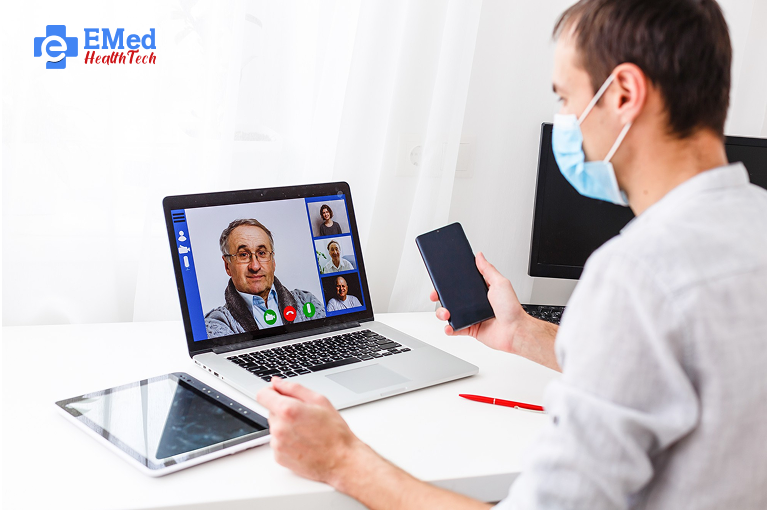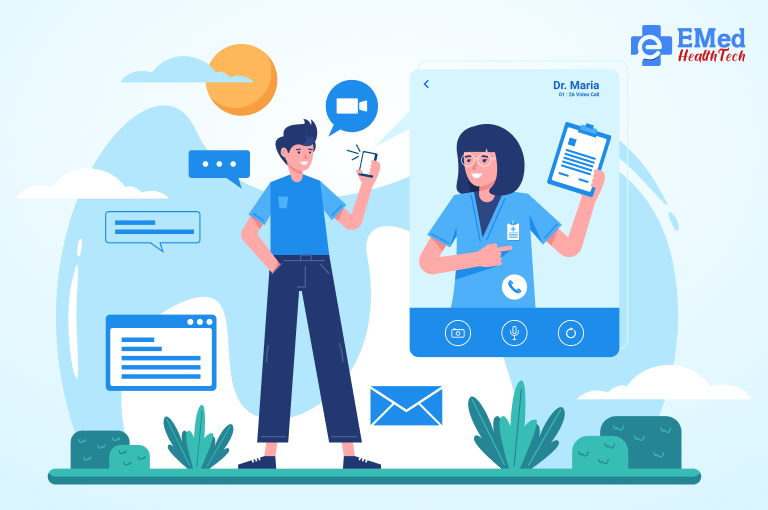Ami Kothari
The focus on mental health has grown stronger in recent years. And much of the credit goes to COVID-19. Quarantine, social distancing, isolation, losing loved ones, and job losses worsened our mental health crisis more than ever. The silver lining in this situation was the mental health apps that provided support and solace during the time of need to millions worldwide.
However, mental health issues continue to be a problem even after the pandemic has waned. WHO estimates that almost 1 billion people have a mental disorder. It’s worse for those living in low-income countries because 75% of them have no access to treatment.
This shows that the need for mental health software isn’t slowing down. So if you have an idea for a helpful app in this niche, keep reading as we unfold the various aspects of developing a mental health app. Our custom healthcare software development team at EMed HealthTech will guide you through our well-implemented methods and solutions to build a mental health app that benefits both users and owners.
What is a Mental Health Software?

Mental health software refers to applications designed to support and improve mental well-being. Users can have these software tools on various devices like smartphones, tablets, or computers.
Mental health apps offer a wide range of features and functionalities to assist individuals in managing their mental health. Some of them go beyond supporting individuals in need. They can be valuable for mental health professionals and organizations in several ways.
- These apps can serve as additional tools for professionals in therapy or counseling practices.
- They can help professionals track and monitor their clients’ progress.
- They also improve communication and engagement between professionals and their clients.
- For mental health organizations, these apps can act as a cost-effective means of extending their reach and impact.
Industry Growth in Mental Health Software Development
The mental health app development industry is experiencing significant growth in the mobile app market due to increasing demand. Statistics show that mental health disorders affect around 20.6% of the US population, with depression being the most prevalent at 3.8%. Concerns about psychological issues have risen by over 28% in Europe and the US, indicating a growing need for mental health support.
Vaile Wright, Ph.D., senior director for healthcare innovation at American Psychological Association, states, “A lot of work that happens in therapy happens outside the therapy office. Apps can facilitate that work. They can also help patients address co-occurring problems like insomnia or serve as booster sessions once therapy has ended.”
There are some challenges in implementing Telemedicine in mental health but, they can be overcome with proper implementation.
Market research predicts that the mental health software market will reach $5.2 billion by 2027, with a compound annual growth rate (CAGR) of 15.2% from 2020 to 2027. The study attributes this growth to the increasing prevalence of mental health disorders, tech advancements, and the growing adoption of telehealth and virtual care solutions.
Types of Mental Health Apps

Mental health app development is mostly about delivering help to people having psychological issues. Various mental health apps are available today, each catering to different needs and preferences. As such, we can categorize mHealth apps into the following types.
1. Cognitive Behavioral Therapy (CBT) Apps
CBT apps deliver evidence-based cognitive behavioral therapy techniques and exercises to individuals seeking self-help for managing anxiety, depression, and other mental health conditions. These apps often include interactive tools and resources for self-reflection and behavior modification.
2. Illness Management and Care Apps
These apps facilitate communication between patients and healthcare providers or specialists. They enable users to track symptoms, record treatment progress, set reminders, and receive guidance or urgent care when needed. These apps can be handy for managing chronic mental health conditions.
3. Symptom Tracker Apps
These apps allow users to monitor and collect data on various aspects of their mental health, such as behavior patterns, social interactions, physical activity, and sleep cycles. While they do not replace professional diagnoses, they provide additional information to caregivers. They can alert specialists when further attention or assistance is required.
4. Insomnia Management Apps
With many people experiencing sleep difficulties, these apps offer tools and techniques to help individuals achieve better sleep. They may include relaxing sounds, guided meditations, sleep tracking, and personalized alarm clocks.
5. Stress Management and Mood Control Apps
Designed to track and manage mood fluctuations, these apps help users better understand and cope with anxiety, depression, or stress. They offer insights into mood patterns, identify triggers, and provide strategies for improving emotional well-being.
6. Relaxation and Meditation Apps
These apps provide programs and audio classes for meditation, breathing exercises, relaxation techniques, and better sleep. They aim to promote mindfulness, stress reduction, and overall mental well-being.
7. Peer Support and Community Apps
Peer support apps provide platforms for individuals to connect with others facing similar mental health challenges. These apps foster a sense of community, allowing users to share experiences, seek advice, and support one another.
Building a Custom Mental Health App

Developing a custom mental health app is crucial for organizations and professionals to create personalized solutions that align with their branding and treatment approaches.
These apps incorporate specific features such as appointment scheduling, secure messaging, progress tracking, and integration with electronic health records. They improve communication, treatment outcomes, and the overall patient experience.
Custom apps also offer flexibility to address unique challenges and requirements of different user groups. Collaboration between software developers, mental health professionals, and stakeholders is necessary for developing a custom mental health app.
The following section will delve deeper into critical considerations, features, and benefits of developing a compelling and impactful solution.
Why Develop a Custom Mental Health Software?

Custom mental health software development has emerged as a crucial tool to bridge the gap between mental health professionals and individuals needing support. This section explores the benefits of developing custom mental health software for both app owners and users.
Benefits For App Owners
Building custom mental health software provides several advantages to app owners.
Personalized care
It offers the opportunity to tailor the application to their specific requirements, ensuring that it aligns with their brand identity and meets the unique needs of their target audience. Customization allows for a personalized user experience, enhancing engagement and increasing the likelihood of positive outcomes.
Efficient features
Custom software development enables app owners to incorporate advanced features and functionalities that address specific mental health challenges. This may include modules for cognitive-behavioral therapies, videos, handouts, goal-setting tools, and quizzes or assessments. These features can provide valuable resources and support for users, empowering them to participate in their mental health journey actively.
Data-driven insights
Custom mental health software allows app owners to gather and analyze data. This helps to get valuable insights into user behavior, treatment effectiveness, and overall app performance. This data-driven approach enables app owners to continuously improve the software, enhance user engagement, and refine treatment approaches based on real-time feedback.
Benefits for App Users
Custom mental health software is a boon for users in several ways.
Greater access and convenience
Through telehealth options, individuals can access mental health services from the comfort of their own homes, eliminating the need for transportation, time off work, or arranging childcare. This is particularly significant for long-term treatment plans, as it provides a safe and convenient alternative to in-person appointments.
Better services
Custom mental health software also expands the range of behavioral health services available to users. It can include one-on-one therapy, group therapy, text therapy, addiction counseling, medication prescribing, mental health screening, and referrals.
With the integration of digital tools and smartphone apps, users can also benefit from features like mood tracking, guided meditations, and self-help resources, enhancing their overall mental well-being.
How EMed HealthTech Can Help You With Successful Mental Health Software Development

According to recent statistics, telehealth appointments for mental health services have surged, offering patients access to therapies, counseling, medication monitoring, and mental health screenings from the comfort of their homes. These facts prove that it’s potential of telemedicine-based mHealth software is pretty high! And that time is right for you to dive into building one. As experienced and trusted healthcare software developers, we will be delighted to help you on this journey.
At EMed HealthTech, our Telemedicine software bridges the gap between healthcare professionals and patients, providing accessible and convenient care. With a strong emphasis on user experience and engagement, our software solution offers several USPs that set us apart from other solutions in the market.
1. Diverse Content and Resources
EMed Healthtech’s mental health software provides users with various categories and Cognitive Behavioral Therapies (CBTs). Users can access educational videos, informative articles, and step-by-step guides aligned with their mental health goals and needs.
2. Quizzes and Assessments
The software includes a comprehensive quiz and assessment module, offering users four types of examinations with predefined sets of multiple-choice questions. These assessments cover anger, anxiety, depression, and insomnia, helping users gain insights into their behavioral health status and empowering them to make informed decisions about their well-being.
3. Personalized Activity Recommendations
EMed Healthtech’s mental health software generates personalized activity recommendations based on the survey scores and assessment results. These recommendations guide users towards engaging in therapeutic activities tailored to their mental health needs, fostering progress and improvement.
4. Diary Module and Support
EMed Healthtech’s software incorporates a diary module that allows users to record their daily thoughts and experiences. Users can receive replies and suggestions based on their diary entries, creating a supportive environment and providing additional guidance to enhance their mental well-being.
The team here at EMed HealthTech is proud to develop effective telemedicine app development solutions for mental health services by delivering tailored solutions, fostering engagement, and offering comprehensive resources and support. To sum it up, our solution is truly user-centric as it prioritizes the unique needs and preferences of app owners and users with its approach.
Ready to Build Your Custom Mental Health Software?
As you have seen, customized apps offer numerous benefits for app owners and users, providing personalized experiences, advanced features, data-driven insights, and convenient access to care.
At EMed HealthTech, we have expertise in helping healthcare enterprises and innovators like you create impactful and scalable solutions. Whether you want to develop an all-in-one custom health app or behavioral health software, you can trust our team to help you build a great product.
Ready to embark on your mental health software development journey? Contact EMed HealthTech today.
Related posts

Telemedicine
The Ultimate Guide to Telehealth App Development: How to Build a Telemedicine Application
The world of healthcare delivery is changing with the digital transformation. With the information age, where convenience and availability are paramount, the way people receive healthcare is evolving.
Read more
Telemedicine
How to Choose the Best Telemedicine App Development Company in the U.S.
Introduction The demand for telemedicine apps in the U.S. is at an all-time high, with healthcare providers rapidly adopting digital solutions to offer remote consultations and improve patient care. Choosing the right telemedicine app development company in the U.S. is crucial for ensuring seamless functionality, compliance with healthcare regulations, and a superior user experience. In […]
Read more
Telemedicine
Telemedicine in 2025: Top Mobile App Development Trends Shaping the Future of Healthcare
As we move into 2025, telemedicine is emerging as a key player in healthcare innovation. The rapid evolution of telemedicine app development redefines patient care and makes healthcare more accessible, flexible, and efficient.
Read more








